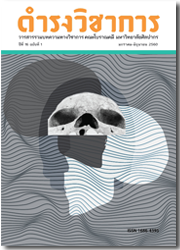Linguistic Strategies used for Refusing Requests and the Factor of Phakphuak ‘partisan’ in Thai Society
Keywords:
Pali and Sanskrit loanwords, phonological change, vowel changeAbstract
Over half of the loanwords found in Thai are borrowed from Pali and Sanskrit. This phenomenon is a result of language contact between Pali Sanskrit and Thai all of which have been around for over a thousand years. This article aims to study phonological changes in Pali and Sanskrit loanwords that are used in Thai with emphasis on vowel changes, according to a historical-comparative linguistics-based study. The process of the phonological change in Pali and Sanskrit loanwords in Thai was found to be systematical. Specifically, the vowel changes in Pali and Sanskrit loanwords were to reduce the number of syllables in original Pali and Sanskrit words. Here are the processes of vowel change in Pali and Sanskrit loanwords in Thai: lengthening, shortening, vowel shifting, diphthongization, monothongization, consonantization and apocope.
References
ฉวีวรรณ ประจวบเหมาะ, 2542. “ผู้ใหญ่-ผู้น้อย.” ใน สุวรรณา สถาอานันท์ และ เนื่องน้อย บุณยเนตร(บรรณาธิการ), คำ: ร่องรอยความคิดความเชื่อไทย. กรุงเทพฯ: สํานักพิมพ์แห่งจุฬาลงกรณ์มหาวิทยาลัย.
ชาญวิทย์ เยาวฤทธา, 2554. วัจนกรรม 3 ชนิดกับแนวคิดเรื่องบุญคุณในสังคมไทย. วิทยานิพนธ์ปริญญามหาบัณฑิต ภาควิชาภาษาไทย คณะอักษรศาสตร์ จุฬาลงกรณ์มหาวิทยาลัย, กรุงเทพฯ.
ชาย โพธิสิตา, 2542. “พรรคพวก.” ใน สุวรรณา สถาอานันท์ และ เนื่องน้อย บุณยเนตร(บรรณาธิการ), คำ: ร่องรอยความคิดความเชื่อไทย. กรุงเทพฯ: สํานักพิมพ์แห่งจุฬาลงกรณ์มหาวิทยาลัย.
ฑิตยา สุวรรณะชฏ และคณะ, 2527. สังคมและวัฒนธรรมไทย: ข้อสังเกตในการเปลี่ยนแปลง. กรุงเทพฯ: มหาวิทยาลัยธรรมศาสตร์.
ณัฐพร พานโพธิ์ทอง, 2555. เอกสารการสอนรายวิชา การวิเคราะห์ภาษาไทยตามแนววัจนปฏิบัติศาสตร์. ภาควิชาภาษาไทย คณะอักษรศาสตร์ จุฬาลงกรณ์มหาวิทยาลัย
ณัฐพร พานโพธิ์ทอง และ ศิริพร ภักดีผาสุข, 2557. ผู้พูดภาษาไทยปฏิสัมพันธ์อย่างไรในการสนทนาแบบเน้นภารกิจ:
การศึกษาข้อมูล Mister O ตามแนว Emancipatory Pragmatics.เอกสารประกอบการสัมมนาวิชาการภาษาและภาษาศาสตร์ ประจำปี 2557 ภาควิชาภาษาศาสตร์ คณะศิลปศาสตร์ มหาวิทยาลัยธรรมศาสตร์.
เมตตา วิวัฒนานุกูล, 2549. การสื่อสารต่างวัฒนธรรม. กรุงเทพฯ: สํานักพิมพ์แห่งจุฬาลงกรณ์มหาวิทยาลัย.
สนิท สมัครการ, 2535. “ความขัดแย้ง ปมปัญหาและอนาคตของสังคมไทย: พิจารณาจากค่านิยมทางวัฒนธรรมเป็นสำคัญ” รายงานวิจัยสังคมและวัฒนธรรม: ข้อสังเกตและการเปลี่ยนแปลง. กรุงเทพฯ: สถาบันพัฒนบริหารศาสตร์.
สุพัตรา สุภาพ, 2529. สังคมและวัฒนธรรมไทย: ค่านิยม ครอบครัว ศาสนาและประเพณี. กรุงเทพฯ: ไทยวัฒนาพานิช.
อคิน รพีพัฒน์, 2539. มองสังคมผ่านชีวิตในชุมชน. กรุงเทพฯ: ศูนย์มานุษยวิทยาสิรินธร (องค์การมหาชน).
Bilmes, J, 1992. “Dividing The Rice: A Microanalysis of Mediator’s Role in A Northern Thai Negotiation.” Language in society 21: 569-602.
Hanks, Ide and Katagiri, 2009. Introduction Towards an emancipatory pragmatics.Journal of Pragmatics 41 : 1-9
Hofstede, G, 1984. Culture’s consequences: international differences in work-related values. Beverly Hills: Sage Publications.
Hofstede, G, 1987. Culture’s consequences: international differences in work-relatedvalues. Beverly Hills: Sage Publications.
Jandt, F. E. and P.B., Pederson, 1996. Constructive conflict management: Asia-Pacific cases. Thousand Oaks; CA: Sage Publications.
Klausner, W. J., 1981. Reflections on Thai Culture. Bangkok: Suksit Siam.
Markus, H. R., and Kitayama, S., 1991. Culture and the Self: Implications for Cognition,Emotion and Motivation. Psychological Review 98, 2: 224-253.
Mulder, N., 1996. Inside Thai society: An interpretations of everyday life. Amsterdam: Pepin Press.
Podhisita, C., 1998. Buddhism and Thai world view. In Amara Ponsapich (Eds.),Traditional and Changing Thai World View (pp. 29-62). Bangkok: Chulalongkorn University Press.
Pongsapich, A (Eds.), 1998. Traditional and Changing Thai World View. Bangkok: Chulalongkorn University Press.
Roongrerngsuke, S., and D. Chansuthus, 1998. Conflict management in Thailand. In K. Leung and D. Tjosvold (Eds.), Conflict management in the Asia Pacific assumptions and approaches in diverse culture(pp. 167-221). Singapore: Wiley.
Triandis, H. C., 1995. Individualism and collectivism. Boulder: Westview Press.
Downloads
Issue
Section
License
บทความนี้เป็นผลงานของข้าพเจ้าแต่เพียงผู้เดียว และ/หรือเป็นผลงานของข้าพเจ้าและผู้ร่วมงาน ตามชื่อที่ระบุในบทความจริง และเป็นผลงานที่มิได้ถูกนำเสนอหรือตีพิมพ์ที่ใดมาก่อน





